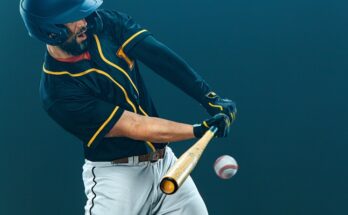Hours after trading for Blake Snell, and hours before swinging a deal for Yu Darvish, the Padres continued their remarkable post-Christmas shopping spree by signing Ha-seong Kim. Kim, a 25-year-old infielder who spent last season with the KBO’s Kiwoom Heroes, was listed as our eighth-best free agent in our top 50 roundup this fall, just ahead of Didi Gregorius and Justin Turner. Per Kevin Acee of the San Diego Tribune, it will be a four-year, $25 million deal. Additionally, Kiwoom will collect a bit of a tax, taking a $5 million release fee from San Diego.
In Kim, the Padres get a player who should claim a starting job right away, and potentially ascend from there. The best way to characterize his recent KBO production is to say that he’s outgrown the league. As the starting shortstop for one of the circuit’s better clubs, Kim has notched a 140 wRC+ in each of the last two seasons. He produced a .306/.397/.523 line last year, with 30 homers and more walks than strikeouts. He’s also swiped 56 bases in 62 tries over the last two years, a 90% clip. Mel Rojas Jr.’s absurd power production deservedly won him the KBO MVP award last season, but make no mistake: Kim was the brightest prospect in the league.
The scouting report backs up the numbers. A tremendous athlete, Kim’s a plus runner with quick hands and a plus throwing arm. At the plate, he has a mature approach, displaying good patience without being passive. Most of his power comes to the pull side, and he adeptly hunts pitches he can drive: Both his swing rate and whiff rate were above average last year, notable in a league that runs a lot of deep counts.

(The image above comes from Ben Howell’s astonishingly good KBO Wizard)
Kim doesn’t have a ton of raw thump — the highest exit velo I saw from him last year was 105 mph, which would be toward the bottom of MLB hitters — but he has a knack for hard contact and projects to have doubles power at the highest level. Strictly from a power perspective, his upside looks something like Paul Dejong’s. It’s an imperfect direct comparison because Kim projects to make much more contact, but like DeJong, he could post outsized homer totals by consistently lining inside pitches into the first few rows of the left field seats.
Defensively, he’s a bit more raw. Eric Longenhagen put a 70 on his arm, and while I very rarely quibble with a guy who has forgotten more scouting than I’ve learned, I’m going to on this occasion: I think it’s a grade lighter, and on top of that his arm isn’t particularly accurate, nor all that strong when he’s on the run. Both of those things take some of the juice out of his range, which is as good as you’d expect from a quick-twitch 60-runner. He clangs a few more balls than your average big league shortstop though (it’s possible that the subpar quality of some KBO diamonds is to blame for that) and the entire package seems a bit light for the six. Fernando Tatis Jr. may eventually move away from short, but it won’t be for Kim. Even at second base though, a patient hitter with a potential six bat and average game power is a damn good player.
At this point, you’ve probably intuited that there’s a bit of a discrepancy between Kim’s lofty billing and the weight of his paychecks. It’s not a particularly long deal and it’s a huge raise for Kim, but $30 million seems like an awfully good bargain for a player with his talent. While there’s some risk here for San Diego, Kim is the best position player to ever hop over from the KBO, and it’s odd that nobody mustered more than Evan White-money for his services.
Speaking of risk: As a 25-year-old with very limited experience against MLB-caliber pitching, there’s a chance that elite fastballs and hard benders prove too vexing to justify his spot in the lineup. The KBO is chalk-full of arms who can spin a slow curve and pelt the corners with 88-90 mph fastballs, but there are only a handful of guys who can touch 95. While Kim has seen that kind of velocity in short spurts during spring training and in international competition, facing it every day will be a different matter. Even if he’s up to the task in the long run, there may be an adjustment period in his future.
There aren’t many direct comparisons you can make here either, as only a handful of KBO position players have crossed the Pacific in recent years and none were as young or as athletic as Kim. As an infielder with defensive flexibility, Jung Ho Kang is probably the closest comparison, though he was 27 and sturdier when he signed with Pittsburgh. Kang posted a 130 wRC+ across his first two big league seasons, and his success at the plate demonstrates that it’s possible for a KBO veteran to make a quick impact in the majors. The other four KBO players who swapped continents struggled, though they were either considerably less talented than Kim or much older and one-dimensional. For what it’s worth, ZiPS loves him, and thinks he’s a budding 3.5-win player:
| Year | BA | OBP | SLG | AB | R | H | 2B | 3B | HR | RBI | BB | SO | SB | OPS+ | DR | WAR |
|---|---|---|---|---|---|---|---|---|---|---|---|---|---|---|---|---|
| 2021 | .274 | .343 | .477 | 503 | 80 | 138 | 29 | 2 | 23 | 82 | 51 | 95 | 17 | 117 | 0 | 3.8 |
| 2022 | .273 | .344 | .482 | 494 | 80 | 135 | 30 | 2 | 23 | 83 | 51 | 97 | 15 | 118 | 0 | 3.8 |
| 2023 | .271 | .344 | .492 | 490 | 80 | 133 | 30 | 3 | 24 | 83 | 52 | 100 | 16 | 121 | 0 | 3.9 |
| 2024 | .270 | .344 | .490 | 478 | 78 | 129 | 29 | 2 | 24 | 82 | 52 | 97 | 15 | 120 | -1 | 3.7 |
| 2025 | .270 | .343 | .490 | 467 | 76 | 126 | 28 | 3 | 23 | 80 | 50 | 91 | 15 | 120 | -2 | 3.5 |
On paper, this should be a great match of player and team. Kim joins a very competitive club but one that has the flexibility to take things a bit slow if he struggles at the outset. In theory, the alignment that makes the most sense is to slot Kim in as the starting second baseman while shifting Jake Cronenworth to the outfield. But if he slumps out of the gate, or if the Padres want to bring him along slowly, Cronenworth can slide back to second, as the Pads have capable reinforcements in the outfield.
The ever-changing nature of the ball makes it difficult to assess how Petco Park will affect Kim’s production. To hedge slightly, Kim’s right-handed bat and pull-side power seem to suit the park as well as any other skill set. Petco has historically been brutal for lefties, but Kim has only modest thump to right center and rarely hits the ball well in the air to straightaway right. And even if a de-juiced ball dampens his home run power, the large alleys should foster a few hustle doubles and perhaps an extra triple or three on balls in the gap.
Kim would have been a great fit for plenty of teams and he’s a boon for San Diego. On top of recent trades for Mike Clevinger, Snell, and Darvish, Kim’s arrival is the latest sign that the Friars aim to upset the balance of power in the NL West. The Dodgers still loom as the best team in baseball, but their margin of error in the division has narrowed considerably. A comparative down year in Los Angeles, like the one they endured in 2018, would open the door San Diego.
That the division is in question at all is something worth celebrating. The Dodgers have had a vice grip on the crown since 2013 and it’s undoubtedly a healthy development for the sport that the defending champions are facing a legitimate threat from their long-dormant southern neighbor. If nothing else, hopefully these moves portend a rush of activity over the next few weeks.
Read More

